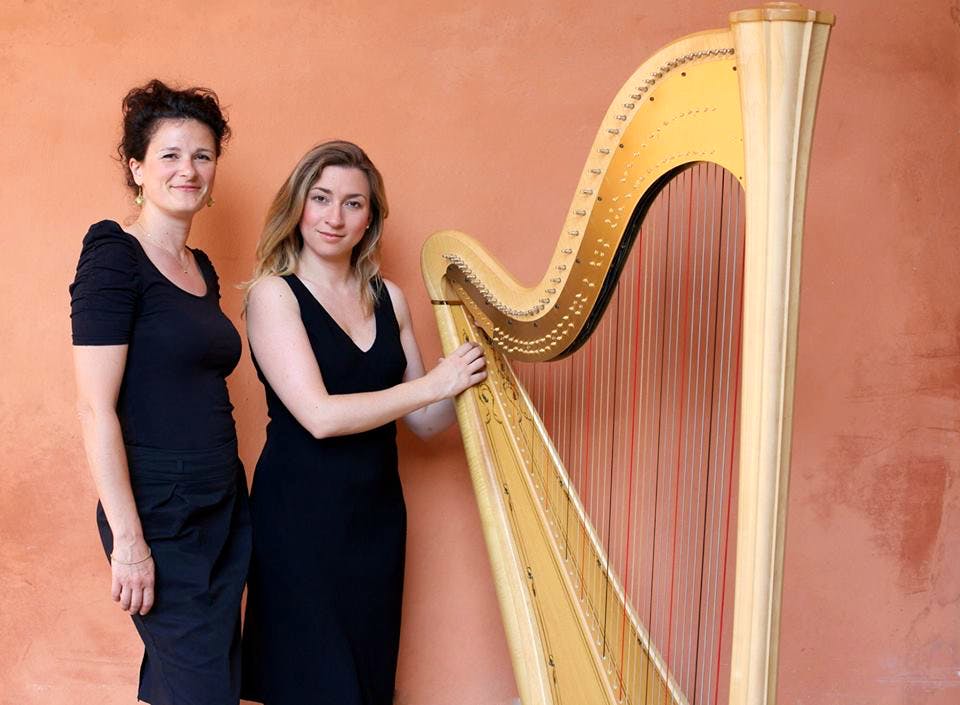“Maria Chiara Pizzoli & Marianne Gubri - Soprano and Harp Concert - Gioacchino Rossini and Isabella Colbran: a Musical Marriage”
Italian Cultural Institute of Mumbai, Consulate General of Italy in Mumbai
The program is dedicated to Gioacchino Rossini (1792-1868) in the 150th anniversary of his death and Isabella Colbran (Madrid, 1785 – Bologna, 1845) the singer, muse and wife of the Italian composer. Even before becoming the Diva of Italian theaters, Isabella had a short but intense period of fame as a singer and composer at the Parisian salons where he was introduced by his father Juan Colbran, then violinist of the Royal Chapel of Spain.
Since the end of 1809 Isabella Colbran opens a long and unique season as an opera singer, first at the Teatro alla Scala in Milan, then at the Teatro Comunale in Bologna, at the Fenice in Venice, in Rome and finally from 1811 in Naples, the city where it will be consecrated «First absolute singer». The aria Assisa a piè d’un salice of the Otello and Arpa Gentil (Viaggio a Reims) were composed with the accompaniment of the harp to enhance the vocal qualities of Isabella, in particular the virtuosity, the vocal range and the dramatic sensibility.
The arias composed by Isabella, all published between 1805 and 1809, on the model of the arias of her contemporaries and masters were composed in Italian with accompaniment for piano or harp. These arias were recorded by Maria Chiara Pizzoli and Marianne Gubri in a First World Recording for the Italian Tactus record label.
The accompaniment of singing with the harp was a custom of the nineteenth century for the “Opera da salotto” where the instrument, thanks to important technical and interpretative advances, had gained a prominent place and skillfully replaced the piano. There were numerous transcriptions and variations on arias of opera made by harpists-composers, the most important of all, the English Elias Parish Alvars (1808-1849), named by H. Berlioz the "Liszt of the harp" for his dazzling musical technique. Rossini himself dedicated to a French noblewoman called 'Cécile' a harp sonata elaborated during a trip to Bordeaux in 1832.
G. Rossini - I. Colbran: a Musical Marriage
The information in this post might be outdated
Event Info
Event Info
“Maria Chiara Pizzoli & Marianne Gubri - Soprano and Harp Concert - Gioacchino Rossini and Isabella Colbran: a Musical Marriage”
Italian Cultural Institute of Mumbai, Consulate General of Italy in Mumbai
The program is dedicated to Gioacchino Rossini (1792-1868) in the 150th anniversary of his death and Isabella Colbran (Madrid, 1785 – Bologna, 1845) the singer, muse and wife of the Italian composer. Even before becoming the Diva of Italian theaters, Isabella had a short but intense period of fame as a singer and composer at the Parisian salons where he was introduced by his father Juan Colbran, then violinist of the Royal Chapel of Spain.
Since the end of 1809 Isabella Colbran opens a long and unique season as an opera singer, first at the Teatro alla Scala in Milan, then at the Teatro Comunale in Bologna, at the Fenice in Venice, in Rome and finally from 1811 in Naples, the city where it will be consecrated «First absolute singer». The aria Assisa a piè d’un salice of the Otello and Arpa Gentil (Viaggio a Reims) were composed with the accompaniment of the harp to enhance the vocal qualities of Isabella, in particular the virtuosity, the vocal range and the dramatic sensibility.
The arias composed by Isabella, all published between 1805 and 1809, on the model of the arias of her contemporaries and masters were composed in Italian with accompaniment for piano or harp. These arias were recorded by Maria Chiara Pizzoli and Marianne Gubri in a First World Recording for the Italian Tactus record label.
The accompaniment of singing with the harp was a custom of the nineteenth century for the “Opera da salotto” where the instrument, thanks to important technical and interpretative advances, had gained a prominent place and skillfully replaced the piano. There were numerous transcriptions and variations on arias of opera made by harpists-composers, the most important of all, the English Elias Parish Alvars (1808-1849), named by H. Berlioz the "Liszt of the harp" for his dazzling musical technique. Rossini himself dedicated to a French noblewoman called 'Cécile' a harp sonata elaborated during a trip to Bordeaux in 1832.

